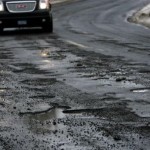 The last few years have seen a number of projects to automate the identification of problems in the road network. For instance, Jaguar Land Rover recently teamed up with Coventry Council to test a project whereby potholes and similar road malfunctions would be automatically reported to the council by the car.
The last few years have seen a number of projects to automate the identification of problems in the road network. For instance, Jaguar Land Rover recently teamed up with Coventry Council to test a project whereby potholes and similar road malfunctions would be automatically reported to the council by the car.
Suffice to say, such developments still require a human operative to travel out and fix the hole. A new research project is exploring the possibility of having cities that self-repair themselves.
Self-repairing cities
Small robots will be developed that can both identify problems in areas such as utility piping, street lighting and road quality, before then fixing the problems themselves, all with minimal disruption to either the public or the environment.
The project is part of the Engineering Grand Challenges research that aims to take on some of the biggest challenges currently facing the science and engineering worlds.
The robots will initially be developed in three core areas:
- Drones that can perch on high strctures and perform various repair tasks, such as fixing street lights.
- Pothole drones that can autonomously inspect the road surface, diagnose potholes, and then patch up the road, whilst also helping to prevent further deterioration.
- Utility robots that live permanently inside utility pipes, performing a continuous monitoring and repair service. Such robots could also report status and even perform metering tasks.
The team are working on the project with Leeds City Council and the UK Collaboration for Research in Infrastructure and Cities (UKCRIC) to ensure that the robots are thoroughly tested before being trialled in a safe and responsible manner in Leeds.
Professor Phil Purnell, from the School of Civil Engineering, is leading the research team. He said: “We want to make Leeds the first city in the world to have zero disruption from street works.
“We can support infrastructure which can be entirely maintained by robots and make the disruption caused by the constant digging up the road in our cities a thing of the past.”
Dr Rob Richardson, director of the National Facility for Innovative Robotic Systems at the University added: “Detecting faults and weaknesses early and then quickly performing smart repairs is the key.
“Our robots will undertake precision repairs and avoid the need for large construction vehicles in the heart of our cities. We will use the unique capabilities of our robotic facility to make new, more capable robots.”
That is utterly remarkable. Thanks for sharing.
Haha, what an awesome project.
Great come up indeed! I truly think by teaming up with these two giant car companies make a real difference. It's an awesome project indeed.